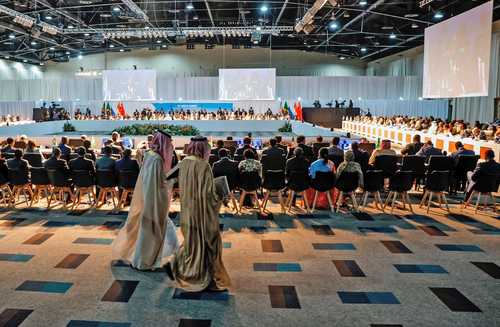With the admission of six more countries to its current composition, the BRICS group of developing economies will control 80 percent of world oil production, a mainstay for the bloc that seeks to create a new balance in the international order that it considers obsolete.
The group currently made up of Brazil, Russia, India, China and South Africa will add Argentina, Egypt, Ethiopia and also the oil giants Saudi Arabia, the United Arab Emirates and Iran, which are, respectively, the first, second and fourth largest producers of the Organization of Petroleum Exporting Countries (OPEC), and together with Iraq and Venezuela are among the five countries with the most energy reserves.
The six new candidates will formally become members on January 1, 2024, South African President Cyril Ramaphosa said. This is the first expansion of the block in 13 years; the only previous one was that of South Africa.
The BRICS have embarked on a new chapter in their effort to build a world that is fair, that is equitable, a world that is also inclusive and prosperous.
said Ramaphosa, at the end of the 15th summit of the group that was held in Johannesburg.
This membership expansion is historic
said Chinese President Xi Jinping, the staunchest supporter of the measure. It shows the determination of the BRICS countries for unity and cooperation with developing countries in general
.
Washington downplayed the group’s expansion and said it will continue to work with all its partners around the world. The United States reiterates its position that countries can choose the partners and groups with which they want to associate
said a State Department spokesman.
The BRICS leaders left the door open for future integration. Dozens of other countries have expressed interest in joining a group they hope can level the global playing field.
The enlargement adds economic weight to the group headed by China, the world’s second largest economy; Brazil, the largest economy in Latin America; Russia, one of the largest oil and gas producers; India and South Africa. It could also encourage your stated ambition to become a driver of the Global South.
The entry of oil powerhouses Saudi Arabia and the United Arab Emirates underscores their departure from the orbit of the United States and their ambition to become global heavyweights in their own right.
Russia and Iran have found common cause in their fight against US sanctions and diplomatic isolation, and their economic ties have deepened after Moscow’s invasion of Ukraine.
However, tensions could persist between members who want to turn the group into a counterweight to the West – in particular China, Russia and now Iran – and those who continue to maintain close ties to the US and Europe.
